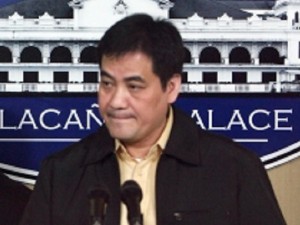Skewered every now and then over unresolved cases of extrajudicial killings, disappearances and torture, Malacañang on Monday stressed its commitment to human rights and released a list of initiatives in its campaign against human rights violations.
“Our policy is clear: We advocate human rights,” presidential spokesperson Edwin Lacierda said in response to the United States Embassy’s call for the government to step up the protection of the people’s rights.
“We frown on extrajudicial killings,” Lacierda said, adding that the administration of President Aquino valued human rights since his family had been a victim of its violation during the regime of former strongman Ferdinand Marcos.
Later in the day, Malacañang posted a list of its initiatives on human rights since the President took over in June 2010, including his recent creation of a “superbody” to look into cases of grave human rights violations.
The initiatives included the crafting of a Human Rights Desk Operations Manual for police personnel, and the setting up of an office for the Armed Forces of the Philippines (AFP) to address all human rights and international humanitarian law issues involving military personnel.
Commission on Human Rights (CHR) Chairperson Loretta Ann Rosales also described the country’s human rights record as having “significantly improved under the administration of President Aquino, particularly in the areas of extrajudicial killings, enforced disappearances and torture.”
Rosales said that since President Aquino took over the reins of government, there were only 96 complaints of human rights violations against the military and 235 against the police from July 2010 to July 2012.
Peasants march
The CHR led the country in celebrating International Human Rights Day on Monday through various activities meant to remind the people of the evils of martial law during the Marcos regime.
Also on Monday, thousands of peasants and indigenous peoples belonging to a militant group from Mindanao and Southern Tagalog, with multisectoral support from the National Capital Region, marched on Mendiola and condemned what they considered to be unabated human rights violations under the Aquino administration.
Karapatan Chairperson Marie Hilao-Enriquez led the marchers in burning a 7-foot effigy of a combined mining excavator and artillery tank, symbolizing the twin evils of large-scale mining and intensified military operations in peasant areas and indigenous people’s communities.
Cristina Palabay, Karapatan secretary general, pointed out that among the 129 victims of extrajudicial killings that they had documented, 69 were farmers and 25 were indigenous peoples. Most of those killed in Mindanao were antimining activists and lumad leaders who were defending their land and the environment against the intrusion of big foreign mining corporations, she said.
Last month, President Aquino issued Administrative Order No. 35 creating an inter-agency committee on extrajudicial killings, enforced disappearances, torture and other grave violations of the right to life and security of persons.
Chaired by the justice secretary, the committee will inventory all human rights violations perpetrated by state and non-state forces; prioritize unsolved cases and assign special investigation teams to establish the identities of the perpetrators; monitor and report cases under investigation, conduct preliminary investigation and trial, and investigate and prosecute new cases.
